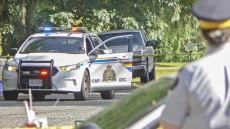VICTORIA — A group that fought to ban pay-for-plasma clinics in Ontario has taken its fight to British Columbia, joining the NDP Opposition in its call against allowing such facilities in the province.
Members of BloodWatch.org were in the legislature Tuesday, when health critic Judy Darcy introduced a private member's bill in hopes of banning companies from compensating donors for plasma, the straw-coloured liquid part of blood used for various medical treatments.
The BC Hemophiliac Society and the B.C. Health Coalition were also at the legislature to back the bill that is modelled after legislation banning payment in Ontario.
BloodWatch.org spokeswoman Kat Lanteigne said outside the legislature that Canadian Blood Services has strict standards for people who donate blood and a private company that collects plasma may not have enough oversight.
She said safeguards may not exist when the plasma is collected, or when it's exported to another country to be made into biological medication that could then be sold back in Canada.
"That is confounding to me why any health minister would ever back that up," she said, adding blood and blood products should remain a public resource, collected from unpaid volunteers.
The company that says it screens all applicants before accepting plasma donations has been in talks with the B.C. government since 2014 about operating clinics in the Vancouver area. Health Minister Terry Lake has said he is open to allowing them.

Manitoba has a pay-for-plasma clinic, as does Saskatchewan, where it is operated by Canadian Plasma Resources, which pays donors $25 in the form of a tax receipt or a reloadable credit card in that amount.
Lanteigne said Canada's tainted blood supply scandal during the 1980s led to the highest safeguards in the world after 30,000 people who received blood transfusions were allegedly infected with HIV or Hepatitis C.
The not-for-profit organization Canadian Blood Services manages the supply of blood and blood products across the country. Its safeguards are the result of the landmark Krever Inquiry, which recommended that donors should not be paid.
The four-year inquiry led by retired judge Horace Krever was tabled in the mid-1990s and heard from people who were living with the tragic consequences of contaminated blood.
B.C. Health Coalition spokesman Adam Lynes-Ford said a family that was impacted by the health scandal was at the legislature Tuesday.
He said Darlene Taylor testified at the Krever inquiry about her two sons receiving tainted blood and that one of them died of AIDS in 1993.
Taylor was in disbelief that the possibility of private companies collecting plasma was even being discussed at the legislature, he said.
Curtis Brandell, 44, is a hemophiliac whose life depends on receiving blood transfusions because his body doesn't have normal clotting abilities, meaning he could bleed for a long time after an injury.

"I'm absolutely petrified," he said outside the legislature about the possibility that a third province could allow a private company to collect plasma.
The federal NDP has also called on Ottawa to ban private, for-profit plasma clinics, citing safety concerns.





